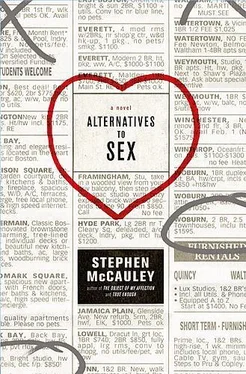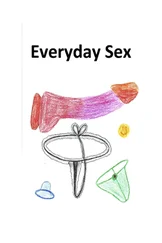Under Samuel and Charlotte’s name, I wrote: Attractive couple, handsome husband, drugged wife, empty nest, both have excellent teeth. Looking for a pied-à-terre with 2 bathrooms. Or nothing? He very touchy. Loves her? I wrote down the address of the place I’d shown them, and then, as an afterthought: Potential friends?
When Jack’s phone rang, a few minutes later, he pointed at it and nodded. “I’ll bet you anything it’s that couple I just hung up on, crawling back to me. Do me a favor and tell them I’m out showing a house on Walnut to a couple of doctors from Weston.”
It was Maria, Jack’s current girlfriend, calling from her cell phone while working out at the Harvard gym. Jack had amazing success with women, mostly younger and attractive women who were, I suspected, looking for an aggressive father figure. Aggressive father figures seemed to have a special appeal since the previous September. Most of the interactions I saw between the two involved Jack advising her on how to undercut some classmate or make trouble for a professor, advice she rejected out of hand but clearly loved hearing. The fact that she openly referred to him as “Daddy” answered any questions about what she saw in stocky, gray-haired Jack.
He used exhaustion and age as an excuse for bragging about his sex life—“At this age, it isn’t easy keeping it up for three hours.” The one time I’d hinted at having a libido, he became distracted, as if we were heading into an uncomfortably dark part of the human experience.
As I was trying to figure out the gist of Jack’s mumbled comments to “Baby,” Gina Fulmetti emerged from the cubbyhole that was her private office, and motioned to me. “I need to talk to you, William,” she said hoarsely.
I held up a finger, indicating that I was in the middle of something I just had to finish. All of the agents at Cambridge Properties worked on commission, and so, technically speaking, we were paying our own salaries. Although there was no real boss to answer to, Gina owned the business, kept an eye on sales figures, paid the overhead, and was the person we all turned to for assistance. It was she who’d hired me to write ad copy and then encouraged me to get into sales. She was fond of me, I knew, mostly because I wasn’t aggressively ambitious and because I took time to get to know people. But the qualities of mine she liked also meant I wasn’t bringing in as much business as she thought I should.
There were usually six full-time agents on staff, plus a few part-timers who appeared to be in it for the business cards and the insider information on sales, always good dinner-party conversation. Almost no one, except Jack, kept full-time hours, and it was rare that more than three people were at their desks at any given moment. And yet, given the prices around Boston and the frenzied atmosphere of buying, selling, and speculating, the overall sales figures for the office had been increasing every year I’d been there, and Gina was, according to Jack, “loaded.”
Her private office was a small windowless box, cluttered with papers and magazines. I felt the usual clutch of claustrophobia as I stooped to enter and shut the door behind me. Gina pointed to a chair, folded her hands on her desk, and stared at me silently for what felt like five minutes. She was usually soft-spoken, but she had a way of looking through me that often made me feel I was melting under her gaze.
“William,” she finally said.
“Yes.”
More silent staring ensued.
“William.”
“Yes.”
“Where are you?”
She had dazzling eyes, huge for her face and a lurid shade of green that was probably from colored contact lenses, but gave her a hypnotic power and made it almost impossible to turn away from her.
“I’m sitting in front of your desk.”
“That’s not what I’m asking. I’m asking you where you are. Where are you?” She ignored her ringing phone and continued to stare at me, waiting for an answer. “I had such high hopes for you. You were doing so well.”
“Well…”
“Now I can’t even see you.” She took a folder out of her desk drawer without breaking eye contact. “Your sales figures.”
“Bad?”
“Disappointing.”
“I agree.”
“Participation at office meetings.”
“Disappointing?”
“Erratic.”
“I was having those problems with my contact lenses.”
“I’m not scolding you, William.”
“I know.”
“I’m worried.”
“Don’t be.”
“You’ve gone, William. You’ve disappeared. I can’t find you.”
I was used to disappointing myself, but I hated to disappoint Gina. She was an unwaveringly positive woman of about sixty-five who’d been through as much trauma and tragedy as anyone I knew. She’d lived through two bouts with cancer, a car accident in which her daughter had nearly died, an explosion of a propane tank that had destroyed two-thirds of her house. Somehow she managed to consider herself the luckiest person alive. The chemotherapy, she’d tell you, had caused her to go bald, but then given her the rich, curly mane she’d longed for her whole life. The car accident had almost killed her daughter, but it had gotten the wayward girl off alcohol and into a nursing career. The propane explosion? “I hated that end of the house, anyway.” It horrified me to think I was disappointing someone who’d managed to find an upside to ovarian cancer.
“It’s funny you should say that,” I said.
“Funny. Why is it funny? What’s funny about the disappearance of someone you care for?”
“I’ve let my attention drift,” I told her. When in doubt, a confession, any confession, usually brings people over to your side. “I realized it this morning. The drifting.”
“And?”
“And I’m making some changes, Gina. Good ones, I hope.”
Her phone started ringing again, but she didn’t avert her mesmerizing eyes for a second. “How?”
“How?”
“How are you changing? What are you doing?”
“I’m reading Simone de Beauvoir,” I said.
“I had high hopes for you, William. You know what I’m talking about, don’t you? I’m talking about my son. He’s going to be fine, it’ll straighten him out, and he’ll be a better person, but he isn’t ever going to be a person sitting here at this desk, at my desk. I had high hopes you might. Do you see what I’m saying?”
A couple of months earlier, her forty-year-old son had confessed to heroin addiction and had entered rehab. From what I could tell, she was saying that she had been thinking of selling me the business at some point. She’d implied as much before, but we’d never discussed it.
“I’m working on it,” I said.
“It’s not as if you have distractions, William. No marriage, family, health problems I know of. This should be your focus.”
“I’m working on it,” I said again.
“I want results. I need results from you. Come back to me, William, come back.” She picked up the phone and put her hand over the mouthpiece. “Now go.”
My ritual upon entering my apartment at the end of the day was to go from room to room making sure there was nothing out of order. Because I went through the same routine before leaving in the morning, I rarely found anything that needed immediate attention, although sometimes the towels demanded refolding or there were spots on the faucets in the bathroom or a few wrinkles on the pillowcases.
My cleaning compulsion was the source of endless no-win situations. I hated finding anything disorganized or dirty, but I got so much pleasure out of setting things right, I felt cheated out of a major source of satisfaction when I didn’t. And so, when I walked into the kitchen and saw that I’d left the ironing board in the middle of the floor that morning, I didn’t know whether to be happy to put it away or alarmed at the glaring oversight that was completely out of character. Where was I, indeed, that I hadn’t noticed? Obviously, I was changing my sexual behavior at the right moment.
Читать дальше












